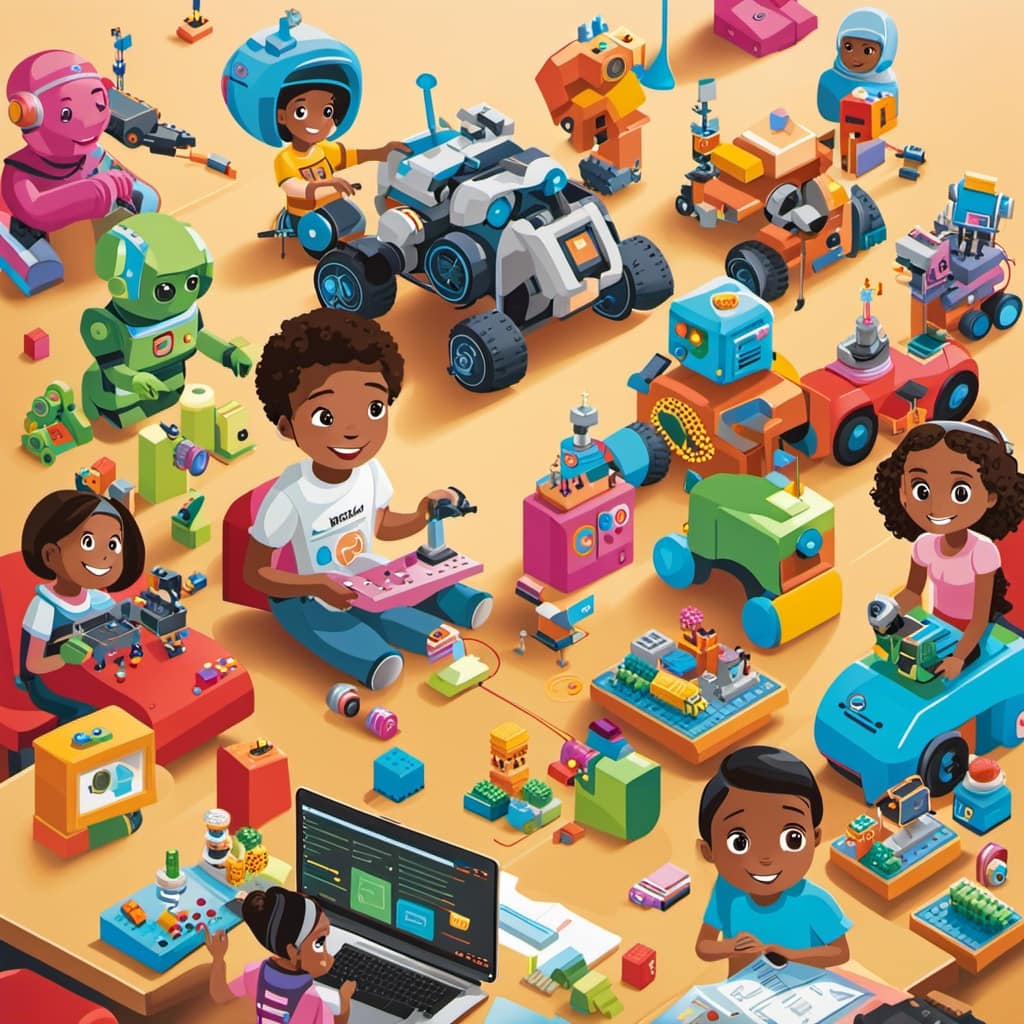Child Development
Screen Time: Impact on Child Development & Healthy Tech Use

As a parent of children, I understand the challenge of controlling the amount of screen time our kids have. Did you know that, on average, kids are spending over 7 hours a day on screens? This excessive technology use can have a significant impact on their development.
In this article, we will explore the effects of screen time on cognitive development, social skills, social interactions, and emotional well-being. We will also provide strategies for promoting healthy technology use and setting boundaries.
Let’s dive in and discover how we can nurture our children’s well-rounded development in the digital era.
Key Takeaways
- Setting clear boundaries and establishing screen time rules is important for limiting screen time and encouraging healthy technology use in children.
- Excessive screen time can negatively affect cognitive development, hindering memory, learning abilities, and concentration.
- Digital communication lacks non-verbal cues, which can hinder understanding of emotions and empathy, and excessive screen time can isolate children and decrease social engagement.
- Excessive reliance on digital communication can lead to addiction, decline in social skills, and exposure to cyberbullying and inappropriate content. Balancing digital communication with real-life interactions is crucial for healthy relationships.
Cognitive Development and Screen Time
Excessive screen time can negatively affect my memory and learning abilities. Research has shown that prolonged exposure to screens can hinder cognitive development, particularly in the areas of memory and learning.
One important aspect of cognitive development is the role of play and imagination. Engaging in imaginative play helps to stimulate the brain and enhance cognitive skills such as problem-solving and creativity. However, excessive screen time can limit opportunities for play and imagination.
Additionally, outdoor activities play a crucial role in cognitive development. Being outdoors exposes me to different sensory experiences, promotes physical activity, and encourages exploration and curiosity. These activities provide valuable opportunities for learning and cognitive growth.

Therefore, it is important to strike a balance between screen time and outdoor activities to support healthy cognitive development.
Social Skills and Communication in the Digital Age
I find that digital communication lacks non-verbal cues, hindering my understanding of emotions and empathy. It can be challenging to accurately interpret someone’s feelings when we can’t see their facial expressions or hear the tone of their voice.
To foster empathy in online interactions and improve digital etiquette, here are four strategies to consider:
-
Use emoticons and emojis: While they may not fully capture the complexity of emotions, they can help convey tone and add context to messages.
-
Practice active listening: Pay attention to the words and emotions expressed by others, and respond thoughtfully to show that you understand and care.
-
Give constructive feedback: When providing criticism or disagreement, do so with kindness and respect, keeping in mind that words alone can be easily misunderstood.

-
Seek clarification: If you’re unsure about someone’s intentions or emotions, ask for clarification rather than making assumptions.
The Impact of Digital Communication on Social Interactions
Balancing digital communication with face-to-face interactions is crucial for fostering healthy social interactions and relationships.
In today’s digital age, online friendships have become increasingly common. While these friendships can offer a sense of connection and support, it is important to understand their impact on our mental health.
Numerous studies have shown that excessive reliance on digital communication can lead to feelings of isolation, anxiety, and depression. The lack of physical presence and non-verbal cues in online interactions hinders the accurate interpretation of emotions, which can further affect our mental well-being.
Therefore, it is essential to find a balance between digital communication and real-life interactions to promote healthy relationships and protect our mental health.
Educating ourselves and our children about safe online behavior is also crucial for fostering positive online friendships and maintaining a healthy digital presence.

Emotional Well-being and Video Games
Playing video games can have both positive and negative effects on my emotional well-being. It’s important to find a balance between gaming and other activities to ensure a healthy and positive experience. Here are four key points to consider when it comes to video games and emotional well-being:
-
Teaching resilience through gaming: Video games can provide opportunities for me to develop resilience and problem-solving skills. Overcoming challenges and setbacks in games can teach me to persevere and bounce back from adversity, which can translate into real-life situations.
-
The role of parental involvement in gaming: Parents play a crucial role in guiding and monitoring my gaming habits. They can set limits, establish rules, and provide guidance on responsible gaming. Open communication with parents about my gaming experiences can help ensure a healthy balance and address any potential negative effects.
-
Recognizing the potential negative impact: Excessive gaming can lead to addiction and negatively affect my emotional well-being. It’s important to be mindful of the amount of time I spend gaming and to prioritize other activities such as physical exercise, social interactions, and hobbies.
-
Maximizing the benefits of gaming: Video games can also have positive effects on my emotional well-being. They can provide entertainment, relaxation, and even educational benefits. Engaging in a variety of game genres and playing with friends can enhance social connections and promote positive emotions.
Strategies for Limiting Screen Time
Establishing clear boundaries and implementing rules can be effective strategies for reducing excessive screen time and promoting healthy technology habits.

However, it is equally important to provide alternative activities that can engage children and encourage their creativity. One such activity is outdoor play, which offers numerous benefits for children’s physical, cognitive, and emotional development.
Outdoor play allows children to explore their surroundings, develop their motor skills, and engage in imaginative play. By encouraging creativity through imaginative play, children can develop problem-solving skills, enhance their cognitive abilities, and foster their imagination.
It also provides an opportunity for social interaction and cooperation with other children. Therefore, alongside limiting screen time, parents should prioritize and encourage outdoor play to ensure a well-rounded and balanced childhood experience for their children.
The Role of Parental Control in Healthy Tech Use
In my experience as a parent, one effective strategy for limiting screen time and promoting healthy technology use is the use of parental control features.
These features allow parents to set restrictions and monitor their child’s access to certain apps or websites.
Parental control software options provide a range of customizable settings, such as time limits, content filters, and activity monitoring.

These tools empower parents to have greater control over their child’s digital activities and ensure that they are engaging in age-appropriate content.
Additionally, parental control software can help parents track their child’s screen time and establish healthy habits.
Balancing Educational Benefits and Excessive Screen Time
As a parent, I find it important to strike a balance between the educational benefits of screens and the potential for excessive use. While technology can play a valuable role in promoting creativity and problem-solving skills, excessive screen time can have a negative impact on educational development. Research has shown that excessive screen time can hinder cognitive development, including memory and learning abilities. However, it is important to note that educational programs and interactive activities on screens can provide valuable learning opportunities. To ensure a healthy balance, it is essential to set clear boundaries and establish screen time rules. Encouraging alternative activities such as reading, outdoor play, and imaginative play can also help mitigate the negative effects of excessive screen time. By promoting a balanced approach, we can harness the benefits of technology while safeguarding our children’s educational development.
| Pros of Screen Time | Cons of Excessive Screen Time |
|---|---|
| Promotes creativity | Hinders cognitive development |
| Enhances problem-solving | Impairs memory skills |
| Provides educational opportunities | Affects focus and concentration |
| Decreases social engagement |
Promoting Healthy Relationships in the Digital World
Maintaining a healthy balance between digital communication and real-life interactions is crucial for promoting healthy relationships in the digital world. In order to foster empathy online and practice good digital etiquette, there are a few key strategies to consider:
-
Think before you type: Taking a moment to consider our words and how they may be perceived can help prevent misunderstandings and promote respectful communication.
-
Show empathy and understanding: In the absence of non-verbal cues, it’s important to actively listen and respond with empathy to others’ perspectives and emotions.

-
Be mindful of tone: Without the ability to convey tone through text, it’s essential to choose our words carefully to ensure our intended meaning is clear and respectful.
-
Practice digital citizenship: Being mindful of our online actions, treating others with kindness and respect, and respecting others’ privacy and boundaries are all essential components of good digital etiquette.
Setting Boundaries and Teaching Responsible Gaming
I can establish clear boundaries and teach responsible gaming to promote a healthy balance between technology and other activities. Teaching responsible gaming is crucial for children’s well-being in the digital age.
By setting boundaries, such as limiting screen time and specifying appropriate game choices, we can help children develop self-control and prioritize other activities. It is important to educate children about the potential risks and consequences of excessive gaming, such as decreased social interaction and emotional well-being.
By teaching responsible gaming, we can empower children to make informed choices and develop healthy habits. Setting boundaries also provides structure and promotes a balanced lifestyle, allowing children to engage in a variety of activities that foster their overall development.
Nurturing Well-rounded Development in the Era of Technology
Balancing a variety of activities in the era of technology is crucial for nurturing well-rounded development. In today’s digital age, it is important to find a balance between screen time and other activities that promote physical and mental well-being.

Here are four creative screen time alternatives to encourage a healthy lifestyle:
-
Engage in outdoor play: Encourage your child to spend time outdoors, engaging in activities like biking, playing sports, or exploring nature. Physical activity not only promotes physical health but also enhances cognitive abilities and social skills.
-
Foster creativity through arts and crafts: Encourage your child to engage in activities like drawing, painting, or building with blocks. These activities stimulate imagination, fine motor skills, and self-expression.
-
Promote reading and storytelling: Encourage your child to read books or narrate stories. Reading enhances language skills, fosters imagination, and promotes critical thinking.
-
Encourage imaginative play: Provide your child with toys or materials that promote imaginative play, such as dolls, action figures, or building blocks. Imaginative play helps develop problem-solving skills, creativity, and social interaction.
Frequently Asked Questions
How Can Parents Effectively Limit Screen Time Without Causing Conflict or Resistance From Their Children?
I can effectively limit screen time without causing conflict or resistance from my child by setting clear boundaries and promoting offline activities. It’s important to communicate the importance of balance and lead by example.

What Are Some Strategies for Encouraging Children to Engage in Alternative Activities Instead of Spending Excessive Time on Screens?
Encouraging kids to engage in alternative activities is important for their development. We can set boundaries, provide options like reading or outdoor play, and be a good example ourselves. It’s all about finding balance.
How Does Excessive Screen Time Affect a Child’s Ability to Focus and Concentrate?
Excessive screen time can negatively impact a child’s ability to focus and concentrate. It can lead to tech addiction and hinder their development. Setting limits and promoting alternative activities are crucial for their well-being and healthy child development.
What Are the Potential Risks of Excessive Digital Communication for Children, Particularly in Terms of Online Safety?
Excessive digital communication poses potential risks for children, especially in terms of online safety. Cyberbullying and exposure to inappropriate content are concerns. Educating children about safe online behavior is crucial for their well-being.
How Can Parents Promote Healthy Relationships and Social Engagement for Their Children in the Digital Age?
To promote healthy relationships and social engagement in the digital age, I encourage parents to prioritize face-to-face interactions, teach responsible technology use, set limits on screen time, and foster open communication about the importance of balance.
Conclusion
In conclusion, it’s evident that excessive screen time can have a detrimental impact on child development. By setting clear boundaries and promoting healthy technology use, we can help children thrive in the digital age.
It’s crucial to prioritize alternative activities, such as reading and outdoor play, and engage in open communication about responsible technology use. By finding a balance between screen time and other activities, we can ensure that children’s cognitive development, social skills, and emotional well-being are nurtured.

Let’s empower our children to navigate the digital world responsibly and foster their overall well-rounded development.
Child Development
All About Me Sorting Neighborhood: Promote Learning and Development With This Fun Toy!

I have found the perfect toy that offers both fun and promotes educational and developmental progress in children.
The All About Me Sorting Neighborhood is a versatile and engaging educational toy that offers various play options, helping children develop important cognitive and motor skills.
With diverse family members represented, this toy encourages imaginative play and teaches children about family dynamics and empathy.
It also enhances problem-solving and social interaction skills.
Made of high-quality plastic, this durable toy is a trusted resource for early childhood education.
Key Takeaways
- The All About Me Sorting Neighborhood toy set engages children in sorting and matching activities to develop color recognition and fine motor skills.
- The toy set offers multiple play options for learning counting, sorting, and shape recognition.
- By representing diverse family members, the toy set promotes inclusivity and social-emotional skill development.
- The toy set enhances problem-solving, negotiation, and social interaction skills while also supporting cognitive development, creativity, imagination, and problem-solving skills.
The Benefits of the All About Me Sorting Neighborhood Toy
I love how the All About Me Sorting Neighborhood toy promotes learning and development through its various features and benefits.

This toy is not only entertaining but also educational. It helps children develop empathy and foster teamwork skills.
The toy represents diverse family members, allowing children to learn about different relationships and family dynamics. By playing with the toy people shaped like family members, children can engage in imaginative play and role-playing scenarios, enhancing their social-emotional skills.
This toy also encourages children to work together in group play, building friendships and teamwork.
Through sorting and matching activities, children can develop their cognitive skills while also strengthening their problem-solving abilities.
Overall, the All About Me Sorting Neighborhood toy is a fantastic tool for promoting learning, empathy, and teamwork in children.
Developing Cognitive Skills Through Play
Engaging in play activities with the All About Me Sorting Neighborhood toy set enhances cognitive skills and fosters problem-solving and social interaction abilities.

Cognitive development through play is a crucial aspect of a child’s growth and learning. Play-based learning provides opportunities for cognitive growth by encouraging children to think critically, make decisions, and solve problems.
With the All About Me Sorting Neighborhood toy set, children can engage in various activities that promote cognitive development. They can sort and match the toy people based on different attributes such as color, shape, or size. This helps them develop their ability to categorize and classify objects, which is an essential cognitive skill.
Additionally, the toy set encourages imaginative play and role-playing scenarios, allowing children to use their creativity and problem-solving skills. By interacting with others during play, children also develop important social interaction abilities, such as taking turns, sharing, and cooperative play.
Overall, the All About Me Sorting Neighborhood toy set provides a fun and engaging way for children to enhance their cognitive skills and foster problem-solving and social interaction abilities through play-based learning.
Enhancing Social and Emotional Development
Playing with the All About Me Sorting Neighborhood toy set allows children to explore and develop important social and emotional skills. This toy set goes beyond just sorting and matching activities; it promotes empathy and inclusivity, fostering a sense of understanding and acceptance in children.
Here’s how:

- Encourages children to recognize and express their own feelings
- Teaches children to understand and empathize with others’ emotions
- Represents diverse family members to promote inclusivity
- Provides opportunities for children to engage in cooperative play and develop teamwork skills
Through these experiences, children learn to navigate social interactions, build relationships, and develop a sense of empathy for others.
The All About Me Sorting Neighborhood toy set is not only fun and engaging, but it also lays the foundation for important social and emotional development.
Promoting Fine Motor Skills and Sensory Stimulation
The All About Me Sorting Neighborhood toy set enhances fine motor skills and provides sensory stimulation through its various shapes, colors, and textures.
The toy set offers a wonderful opportunity for sensory exploration and motor skill development.
The different shapes, colors, and textures of the toy people provide a sensory-rich experience for children.
As they grip, place, and sort the toy people, they develop their fine motor skills, hand-eye coordination, finger dexterity, and muscle control.

The toy set can be further enhanced by incorporating sensory bins or trays with different textured materials.
This allows children to engage in additional sensory experiences while practicing their sorting skills.
The All About Me Sorting Neighborhood toy set is a fantastic tool for promoting both sensory stimulation and motor skill development in a fun and interactive way.
Trustworthy Learning Resources for Early Childhood Education
I trust Learning Resources as a brand that provides high-quality educational resources for early childhood education. When evaluating educational toy brands, trust is of utmost importance. Here are four reasons why Learning Resources stands out:
- Extensive lineup of educational toys designed to make learning fun and interactive
- Developed with expertise and understanding of child development
- Trusted by teachers and parents for educational standards and children’s growth and learning
- Committed to providing high-quality, engaging, and effective learning tools
When it comes to choosing learning resources for young children, it’s crucial to have trust in the brand. Learning Resources has been in the industry for over three decades, consistently delivering educational toys that meet the needs of children. Their commitment to quality, expertise in child development, and the trust they have earned from educators and parents make them a reliable choice.
With Learning Resources, you can be confident that you are providing your child with the best tools for learning and development.

Recommendations From the Editor: a Fun and Educational Toy
As the editor, I highly recommend the All About Me Sorting Neighborhood toy set for its engaging and educational features. This toy set offers numerous benefits, including the promotion of imaginative play and the importance of inclusive toys.
Through imaginative play, children can explore their creativity, problem-solving skills, and social interactions. The All About Me Sorting Neighborhood toy set represents diverse family members, allowing children to learn about different cultures, understand the importance of inclusivity, and develop empathy.
Frequently Asked Questions
What Age Range Is the All About Me Sorting Neighborhood Toy Set Suitable For?
The All About Me Sorting Neighborhood toy set is suitable for children in a wide age range. It offers numerous benefits, such as promoting cognitive development, enhancing problem-solving skills, and fostering social interaction.
Can the Toy People in the Set Stand on Their Own?
The toy people in the set may not stand well on their own. However, this encourages interactive and imaginative play as children can practice fine motor skills and balance skills while engaging with the toy set.
Are There Any Additional Materials or Accessories Needed to Enhance the Sensory Experience With This Toy Set?
To enhance the sensory experience with this toy set, you can use sensory bins or trays with different textured materials. This promotes sensory stimulation while practicing sorting skills, and benefits imaginative play.
How Many Different Families Are Included in the All About Me Sorting Neighborhood Toy Set?
There are multiple families included in the sorting neighborhood toy set, providing diverse characters for imaginative play. It promotes social-emotional development through role-playing scenarios and teaches children about family dynamics and relationships.

Is the All About Me Sorting Neighborhood Toy Set Available for Purchase Online?
Yes, you can find the All About Me Sorting Neighborhood toy set for sale online. The price may vary depending on the retailer. It’s a fun and educational toy that promotes learning and development.
Conclusion
In conclusion, the All About Me Sorting Neighborhood toy is like a key that unlocks a world of learning and development for children. It’s a magical tool that sparks their imagination, ignites their curiosity, and helps them soar to new heights of knowledge.
With its versatile play options, diverse family members, and high-quality design, this toy is a trusted companion on the journey of early childhood education.
So, grab this treasure trove of fun and watch your child’s mind bloom like a vibrant garden of possibilities!
Child Development
Becoming a Child Development Specialist: A Path to Helping Children Thrive

Starting a career as a Child Development Specialist can be a rewarding journey that focuses on helping **children** thrive and succeed. By choosing this path, you will have the opportunity to make a positive impact on the well-being of **children**, supporting their growth and development along the way. If you are passionate about **children**’s welfare and enjoy working with them, this career choice could be the perfect fit for you. Let’s explore how becoming a Child Development Specialist can lead to a fulfilling career where you can truly make a difference in **children**’s lives. Are you ready to embark on this exciting journey? Let’s find out more!
As someone who has always had a passion for working with children, I embarked on a journey to become a child development specialist. This field offers a rewarding opportunity to make a positive impact on young lives.
Through my studies and field experience, I’ve gained a deep understanding of cognitive, social, emotional, and physical development. With patience, empathy, and effective communication skills, I strive to create an environment where children can flourish.
Join me as we explore the ins and outs of this fulfilling career path.
Key Takeaways
- Minimum education requirement is a Bachelor’s degree in a related field
- Field experience is crucial for developing practical skills and knowledge
- Certification process ensures competence in the child development field
- Specialization and career advancement opportunities are available for child development specialists.
Education and Training Requirements
I need to earn a Bachelor’s degree in a related field to meet the minimum education requirement for becoming a child development specialist.
To accommodate my busy schedule, I am grateful for the flexibility of online degree programs. These programs allow working individuals like me to pursue higher education without compromising our current commitments.

The curriculum of these programs covers various aspects of child development, including cognitive, social, emotional, and physical development. Additionally, they focus on child psychology, family dynamics, and early intervention strategies.
In order to gain specialized knowledge and skills, there are also training options available such as certificate programs, associate degrees, and bachelor’s degrees. These specialized training programs allow me to enhance my understanding of specific areas of child development, ensuring that I am well-prepared to support and guide children in their growth and development.
Flexibility of Online Degree Programs
Online degree programs offer flexibility for individuals who are working and seeking a related field bachelor’s degree. They provide the convenience of studying at your own pace, allowing you to balance your work and online studies. However, it’s important to consider the pros and cons of online learning before making a decision.
| Pros | Cons |
|---|---|
| Flexibility in scheduling | Lack of face-to-face interaction |
| Access to a wide range of courses | Requires self-motivation and discipline |
| Eliminates commuting time and expenses | Limited networking opportunities |
Finding the right balance between work and online studies can be challenging, but with proper time management and dedication, it is achievable. It’s crucial to create a schedule, set goals, and prioritize tasks. Additionally, seeking support from family, friends, or online communities can provide encouragement and guidance. Remember, the flexibility of online degree programs can be a valuable asset, allowing you to pursue your career goals while maintaining your professional commitments.
Comprehensive Curriculum Coverage
Completing a bachelor’s degree in a related field provides a comprehensive curriculum that covers cognitive, social, emotional, and physical development. This comprehensive curriculum coverage is crucial for aspiring child development specialists for three reasons.
Firstly, a deep understanding of cognitive development allows us to create appropriate learning environments and activities that stimulate children’s thinking and problem-solving skills.

Secondly, knowledge of social development enables us to foster positive relationships among children and teach them important social skills, such as empathy and cooperation.
Lastly, understanding emotional development helps us support children’s emotional well-being and teach them effective ways to manage their emotions.
As child development specialists, we are committed to lifelong learning. We continuously seek new research and advancements in the field to ensure we provide the best care and support for children’s growth and development.
Our commitment to lifelong learning allows us to stay up-to-date with new strategies and interventions that can positively impact children’s lives.
Specialized Training Options
Gaining specialized training in a specific area of child development enhances my knowledge and skills, allowing me to provide more effective support to children and their families.
When it comes to pursuing specialized training in child development, online degree programs offer a convenient and flexible option for individuals who are already working or have other commitments. These programs provide a comprehensive curriculum that covers various aspects of child development, including cognitive, social, emotional, and physical development. Additionally, they also focus on child psychology, family dynamics, and early intervention strategies.

The duration of these degree programs varies, usually taking around four years of full-time study. However, there are also other training options available, such as certificate programs and associate degrees, which may qualify for entry-level positions.
Ultimately, specialized training programs allow me to gain a deeper understanding and expertise in a specific area of child development, enabling me to make a more significant impact on the lives of children and their families.
Importance of Field Experience
Field experience in child development allows me to observe behaviors, understand developmental milestones, and collaborate with professionals to enhance interdisciplinary approaches. Through hands-on training, I’ve gained practical skills that are essential in this field.
Here are the benefits of hands-on training and how it helps in developing practical skills:
- Direct interaction with children provides real-life scenarios to apply theoretical knowledge.
- Field observations require problem-solving skills and critical thinking, which are honed through hands-on experiences.
- Collaborating with professionals from different disciplines enhances interdisciplinary approaches and enriches the learning process.
Field experience not only prepares me for the certification process but also equips me with the necessary skills to make a positive impact on children’s lives. It is through these experiences that I’ve developed a deep understanding of child development and the importance of applying theory to practice.
Collaboration and Interdisciplinary Approaches
Working collaboratively with professionals from different disciplines enhances my understanding of child development and allows for a more comprehensive approach to supporting children’s growth and well-being.

Collaborative learning is a vital aspect of being a child development specialist. By working with professionals from fields such as psychology, education, and healthcare, I gain valuable insights and perspectives that contribute to my knowledge base.
This interdisciplinary approach promotes a holistic understanding of children and their needs. Through collaborative research, we can explore innovative strategies and interventions that benefit children across various domains of development.
Interdisciplinary research allows us to uncover connections and patterns that may not have been apparent within a single discipline. It fosters creativity, problem-solving, and a deeper understanding of the complexities of child development.
Certification Process Overview
The certification process for child development specialists involves several steps. First, professionals must review the requirements for certification. This includes understanding the necessary documentation that needs to be gathered. Once the requirements are understood, professionals can begin completing the education requirements and training programs necessary for certification.
Certification is beneficial for several reasons. First, it provides recognition of a professional’s commitment to professionalism and expertise in the field of child development. This recognition enhances credibility and sets professionals apart from others in the industry.
Second, certification opens doors to career advancement opportunities. With certification, professionals may be eligible for leadership roles or specialized positions. This can increase earning potential and provide additional job prospects.

Third, certification ensures that child development specialists have the necessary knowledge and skills to provide quality care and support for children’s development. The certification process ensures competence in the field.
Fourth, certification allows professionals to connect with others in the field. This networking opportunity allows for knowledge sharing and collaboration on best practices.
Opportunities for Specialization and Career Advancement
As a child development specialist, I understand the importance of continuous growth and career advancement in our field. One exciting opportunity for specialization is in the area of early childhood education. By focusing on this specific aspect of child development, professionals can gain expertise in designing and implementing effective educational programs for young children.
With this specialization, individuals can explore various roles, including program director positions. As a program director, you would have the chance to lead and oversee the development and implementation of early childhood education programs. This role allows you to make a significant impact, ensuring that children receive high-quality education and care during their crucial early years.
Factors Influencing Salary and Job Opportunities
I believe that a combination of experience, education, and location significantly influences job opportunities and salary potential in the field of child development. Factors influencing salary, job opportunities, salary expectations, and career growth are important considerations for those pursuing a career in child development. Here are three key points to consider:
- Demand and Location:
- Job opportunities vary depending on the demand for child development specialists in different regions.
- Urban areas with a higher population tend to offer more job prospects.
- Rural areas may have fewer opportunities but may offer a better work-life balance and a closer-knit community.
- Education and Experience:
- Higher levels of education, such as a master’s degree or specialized certifications, can lead to more advanced job opportunities and higher salary potential.
- Relevant work experience, gained through internships, volunteer work, or previous employment, is highly valued by employers.
- Continuing education and staying up-to-date with the latest research and advancements in the field can open doors to career growth and higher salaries.
- Industry and Sector:
- Child development specialists can work in various settings, including schools, healthcare facilities, government agencies, and non-profit organizations.
- Different sectors may offer different salary ranges and benefits.
- The demand for child development specialists may vary across sectors, with schools and early childhood education centers being the most common employers.
Considering these factors can help individuals set realistic salary expectations and make informed decisions about their career path in child development.

Commitment to Lifelong Learning and Personal Growth
Continuing to learn and grow throughout my career in child development is essential for staying current with research and best practices.
Lifelong learning allows me to deepen my knowledge and understanding of child development, ensuring that I can provide the best possible support and guidance to children and their families.
It also allows me to stay up-to-date with the latest advancements in the field, enabling me to implement evidence-based strategies and interventions.
Personal growth is equally important, as it encourages self-reflection and continuous improvement.
It helps me develop essential skills such as empathy, patience, and effective communication, which are crucial for building meaningful relationships with children and their families.
Frequently Asked Questions
What Are the Job Prospects for Child Development Specialists Outside of Traditional Educational Settings?
Job prospects for child development specialists outside of traditional educational settings include opportunities in community centers, healthcare facilities, and government agencies. These roles allow me to make a positive impact on children’s lives beyond the classroom.

How Does a Child Development Specialist Differ From a Child Psychologist or School Counselor?
As a child development specialist, I can explain that while child psychologists and school counselors focus on mental health, my expertise lies in understanding and promoting holistic child development.
Are There Any Alternative Options for Expediting the Certification Process for Child Development Specialists?
Yes, there are alternative options available for expediting the certification process for child development specialists. These options can help individuals complete the certification faster or recognize prior learning and experience.
Can You Provide Examples of Specialized Training Programs Available for Child Development Specialists?
Specialized training programs in child development offer valuable expertise. Professional certifications and continued education ensure up-to-date knowledge. Online courses provide flexibility. Helping children thrive is a rewarding path that requires dedication and lifelong learning.
What Are Some Examples of Interdisciplinary Approaches in the Field of Child Development?
Interdisciplinary approaches in child development include incorporating play-based learning to help children reach developmental milestones. By collaborating with professionals from different fields, we can create comprehensive strategies that support children’s holistic growth and development.
Conclusion
In conclusion, embarking on the path to becoming a child development specialist is like planting a seed of hope in the hearts of children.
Through a bachelor’s degree and specialized training, we nurture our knowledge and skills, like a well-tended garden.

Field experience allows us to witness the blossoming of little minds, understanding their unique needs and milestones.
Certification is the key that unlocks doors to endless opportunities for growth.
Remember, as we navigate this rewarding journey, let us always stay rooted in a commitment to lifelong learning, ensuring that we continue to bloom alongside the children we serve.
Child Development
Benefits of Toy Play in Preschool Education: Enhancing Learning and Development

As a preschool teacher, I am constantly amazed by the powerful impact that play has on enhancing both learning and development. Toys are not just for fun; they play a crucial role in promoting active learning, creativity, and problem-solving skills.
Through play, children engage in sensory experiences that enhance their cognitive development and critical thinking skills. In this article, we will explore the numerous benefits of toy play in preschool education, from improving spatial awareness to fostering social and emotional growth.
So, let’s dive in and discover the incredible world of toy play!
Key Takeaways
- Toy play in preschool education promotes hands-on learning, fosters creativity, and allows children to use their imagination and problem-solving skills.
- Engaging with toys enhances problem-solving skills, spatial awareness, visualization abilities, creativity, and imagination, leading to a positive impact on academic and personal life.
- It is important to consider toy materials and safety standards to ensure comfort, sensory development, problem-solving skills, hand-eye coordination, and to avoid harmful substances, choking hazards, and toxic chemicals.
- Toy play also contributes to the development of fine motor skills, such as strengthening hand and finger muscles, improving coordination and dexterity, and can be achieved through activities like building blocks, puzzles, and play dough. Additionally, everyday objects can also enhance fine motor skills, such as threading beads, pouring water, and using tongs.
The Power of Play: How Toy Play Enhances Learning and Development
I can see the power of toy play in enhancing learning and development. It promotes hands-on learning, fosters creativity, and allows children to use their imagination and problem-solving skills.
Toys offer a world of possibilities where children can become anyone they want to be and create anything they can imagine. This power of imagination is crucial for their cognitive and emotional development.
Additionally, toy play provides numerous sensory experiences that stimulate the senses and enhance cognitive development. Children can explore different textures, colors, and sounds, engaging their senses and making learning more enjoyable.

These sensory experiences not only aid in the development of their senses but also help them make connections and understand the world around them.
Overall, toy play offers a multitude of benefits, tapping into the power of imagination and sensory experiences to support children’s learning and development.
Cognitive Boost: How Toy Play Enhances Problem-Solving Skills
Engaging with different types of toys helps me develop problem-solving skills and think critically. Here are five ways toy play enhances problem-solving skills and promotes hands-on learning:
-
Problem-solving strategies: Toys provide opportunities to encounter and solve problems, encouraging me to think creatively and develop problem-solving strategies.
-
Hands-on learning: Engaging with toys allows me to actively explore and manipulate objects, fostering experiential learning and problem-solving abilities.
-
Spatial reasoning: Building with blocks or solving puzzles helps me develop spatial awareness and visualization skills, essential for solving complex problems.

-
Logical reasoning: Toys with mechanics or puzzles challenge me to think logically and systematically, improving my ability to analyze and solve problems step by step.
-
Trial and error: Toy play encourages experimentation and learning from mistakes, teaching me resilience and the importance of trying different approaches to solve problems.
Through toy play, I can enhance my problem-solving skills and develop a critical mindset, setting a foundation for success in various aspects of life.
Spatial Skills: The Impact of Toy Play on Visualization Abilities
Exploring various types of toys helps me develop a strong ability to visualize and understand spatial relationships. Spatial reasoning is an essential skill that enables us to mentally manipulate objects and understand how they fit together in space.
Toy play provides a perfect platform for developing these skills. Building blocks, puzzles, and construction sets require us to manipulate pieces and visualize how they fit together to create a structure. This promotes problem-solving skills as we figure out the best way to complete the task.
Through toy play, we learn to understand the relationship between objects and their positions in space, which is crucial for activities such as reading maps or following directions. By engaging in spatially-oriented play, we enhance our problem-solving skills and develop a valuable cognitive ability that extends beyond the realm of toys.

Unleashing Creativity: How Toy Play Sparks Imagination
Unleashing creativity, toy play sparks my imagination and allows me to explore new worlds and scenarios. It is a vital aspect of preschool education that goes beyond entertainment. Here are the ways in which toy play enhances learning and development:
-
Toy play and problem solving: Developing critical thinking skills. Through play, children encounter challenges and develop problem-solving abilities in a fun and interactive way.
-
Toy play and emotional intelligence: Fostering empathy and understanding. Role-playing with toys allows children to step into different perspectives, understand emotions, and develop empathy towards others.
-
Hands-on learning and creativity: Toys promote imaginative play, encouraging children to create their own stories and scenarios, enhancing their creativity and imagination.
-
Cognitive development: Toy play stimulates cognitive skills, including memory, attention, and spatial awareness, which are essential for academic success.
-
Social interaction: Playing with toys in groups promotes social skills such as sharing, turn-taking, and collaboration, enabling children to build meaningful relationships.

Incorporating toy play into preschool education is a powerful tool for enhancing learning, problem-solving, emotional intelligence, and creativity in young children.
Critical Thinking: Developing Analytical Skills Through Toy Play
When I engage in toy play, I develop critical thinking skills and enhance my analytical abilities. Toy play not only provides enjoyment but also fosters cognitive development, particularly in the area of problem-solving.
By engaging with toys, I am challenged to think critically and find solutions to various challenges and puzzles. This process encourages analytical thinking in problem-solving and helps me develop essential critical reasoning skills.
Through toy play, I learn to analyze different situations, evaluate options, and make informed decisions. This type of play-based learning promotes a growth mindset and prepares me for future academic and personal success.
Play for Success: The Positive Impact of Toy Play on Academic and Personal Growth
Engaging with toys has a positive impact on my academic and personal growth, fostering critical thinking skills, creativity, and problem-solving abilities.
- Toy play enhances academic achievement by promoting hands-on learning and cognitive development.
- It stimulates creativity and imagination, allowing for innovative thinking and unique solutions.
- By playing with toys, I develop problem-solving skills, learning to approach challenges with a strategic mindset.
- Toy play also fosters adaptability and resilience, as I encounter different scenarios and find ways to overcome obstacles.
- Additionally, engaging with toys promotes personal growth by nurturing social and emotional skills, such as empathy and cooperation.
Research shows that toy play not only provides enjoyment but also contributes to holistic development. By actively involving myself in play, I enhance my academic achievements and personal growth, setting a foundation for lifelong learning and success.

Choosing the Right Toys: Understanding Materials and Safety Standards
As a parent, I prioritize understanding toy materials and safety standards when selecting toys for my child’s playtime. It is crucial to ensure that the toys are safe and free from harmful substances or choking hazards. By adhering to toy safety standards, we can create a safe environment for our children to explore and learn. Sensory play, in particular, has numerous benefits for their development. It engages their senses and enhances cognitive skills such as problem-solving, hand-eye coordination, and fine motor skills. To make informed choices, it is important to understand the materials used in toy manufacturing. Here is a table that provides an overview of different toy materials and their impact on child development:
| Toy Material | Impact on Child Development |
|---|---|
| Wood | Promotes sensory development, problem-solving skills, and fine motor skills |
| Plastic | Provides durability and longevity, withstands wear and tear |
| Fabric | Enhances tactile exploration, sensory development, and imaginative play |
| Metal | Strengthens hand and finger muscles, promotes fine motor skills |
| Rubber | Improves grip and coordination, supports sensory development |
Fine Motor Fun: Developing Dexterity Through Toy Play
I love watching my child’s dexterity improve as they engage with different toys. Toy play benefits preschool development by enhancing fine motor skills and coordination.
Here are five ways toy play can support the development of dexterity:
-
Manipulating small objects: Toys like building blocks and puzzles require precise hand movements and finger control, strengthening hand and finger muscles.
-
Grasping and gripping: Playing with toys that require grasping and gripping, such as play dough or threading beads, helps improve coordination and dexterity.
-
Using tools: Toys that involve using tools, like pouring water or using tongs, promote the development of fine motor skills.

-
Hand-eye coordination: Many toys, such as ball games or stacking toys, require hand-eye coordination, honing the ability to synchronize hand movements with visual input.
-
Different textures: Toys with various textures provide sensory experiences that stimulate the development of fine motor skills.
Building Social Skills: The Role of Toy Play in Emotional Development
Observing my child’s interactions with toys, I’ve noticed how they role-play and use their imagination to understand different perspectives and develop empathy. This type of play is crucial for their social and emotional development.
Role-playing allows children to put themselves in someone else’s shoes, promoting empathy and understanding. Through pretending to be different characters, they learn to recognize and express different emotions. This enhances their emotional intelligence and helps them build meaningful relationships with others.
Toy play also teaches important social skills such as turn-taking, sharing, and collaboration. By engaging in cooperative games, children learn to work together and communicate effectively.
Overall, toy play is an effective tool for developing social and emotional skills, fostering empathy, and building strong relationships with others.

Empathy and Cooperation: Fostering Social and Emotional Growth Through Toy Play
As we have discussed the importance of toy play in emotional development, it is crucial to explore how toy play can specifically foster empathy and cooperation in preschoolers. Engaging in empathy-building activities and cooperative play has numerous benefits for a child’s social and emotional growth.
Here are five ways in which toy play promotes empathy and cooperation:
- Role-playing scenarios allow children to understand different perspectives and develop empathy towards others.
- Cooperative games teach essential skills like turn-taking, sharing, and collaboration.
- Toys depicting various emotions help children recognize and understand different feelings, enhancing their emotional intelligence.
- Through toy play, children can develop a sense of empathy towards others by putting themselves in someone else’s shoes.
- Engaging in cooperative play with peers helps children build meaningful relationships and develop crucial social skills.
Frequently Asked Questions
What Are Some Common Manufacturing Techniques Used for Making Toys?
Some common manufacturing techniques used for making toys include molding techniques and assembly methods. These techniques are crucial in creating safe and durable toys that promote children’s development and play experiences.
What Are the Safety Standards That Toys Should Meet to Ensure Child’s Well-Being?
Toy Safety Standards are crucial for ensuring a child’s well-being. They include measures to prevent choking hazards, toxic chemicals, and harmful substances. Understanding the importance of toy safety helps make informed choices for a child’s playtime.
How Can Everyday Objects Be Used to Enhance Fine Motor Skills in Preschoolers?
Using household items for sensory play and creative ways to incorporate everyday objects into fine motor activities for preschoolers are effective strategies for enhancing their fine motor skills and promoting development.
How Does Role-Playing With Toys Help Children Develop Empathy?
Role-playing with toys helps develop empathy by allowing children to step into different perspectives and understand others’ feelings. Benefits of imaginative play in preschool education include fostering empathy and promoting social-emotional development.

What Are Some Examples of Cooperative Games That Can Teach Turn-Taking and Collaboration Skills?
Cooperative games, like board games and team sports, teach turn-taking and collaboration skills, fostering social development. These benefits contribute to the overall importance of toy play in developing social skills and building meaningful relationships.
Conclusion
In conclusion, toy play in preschool education offers a plethora of benefits for children’s learning and development.
Through hands-on engagement with toys, children enhance their problem-solving skills, spatial abilities, and creativity.
Toy play also fosters critical thinking and analytical skills, while promoting the use of safe and developmentally appropriate materials.
Additionally, it helps children develop fine motor skills and supports their social and emotional growth by encouraging role-playing, cooperation, and empathy.
Ultimately, incorporating toy play into preschool education creates an enriching and engaging environment that promotes holistic development.

-

 Child Development3 months ago
Child Development3 months agoEgocentrism: Understanding a Child’s Perspective
-

 Child Development1 month ago
Child Development1 month agoThe Benefits of Dramatic Play in Child Development
-

 Child Development1 month ago
Child Development1 month agoSymbolic Thinking: A Key Milestone in Cognitive Development
-

 Child Development3 months ago
Child Development3 months agoThe Importance of Socialization in Child Development
-

 Child Development3 months ago
Child Development3 months agoThe Power of Cooperative Play in Child Development
-

 Child Development1 month ago
Child Development1 month agoSensory Play: Boosting Brain Development and Learning
-

 Child Development3 months ago
Child Development3 months agoBuilding Blocks: Enhancing Cognitive Development and Problem-Solving Skills
-

 Child Development3 months ago
Child Development3 months agoThe PIES Model: A Holistic Approach to Child Development















